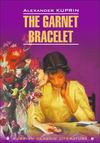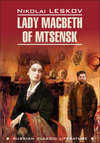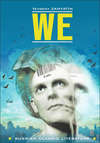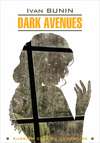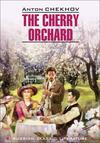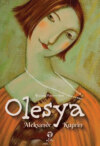Kitabı oku: «The Garnet Bracelet and other Stories / Гранатовый браслет и другие повести. Книга для чтения на английском языке»
© КАРО, 2019
Moloch
I
A long blast from the mill siren announced a new working day. The deep, raucous sound seemed to come up from the bowels of the earth, spreading low above the ground. The murky dawn of a rainy August day tinged it with melancholy and foreboding.
The signal found Engineer Bobrov drinking tea.
During the last few days he had been suffering more than ever before from insomnia. Although he went to bed with a heavy head and started every moment with a jolt, he managed quite soon to drop off into a restless sleep; but he woke up long before dawn, shattered and irritable. This was doubtless due to mental and physical strain, and to his old habit of taking injections of morphia, a habit which he had recently begun to fight in earnest.
He now sat at the window, sipping his tea, which he found flat and tasteless. Raindrops zigzagged down the panes, and ruffled and rippled the puddles. Out of the window he could see a square pond framed by shaggy willows with bare, stumpy trunks and greyish-green leaves. Gusts of wind sent small waves racing over the surface of the pond, while the leaves of the willows took on a silvery hue. The faded grass, beaten down by the rain, drooped limply to the ground. The neighbouring village, the dark, jagged band of a forest stretching on the horizon, and the field patched with black and yellow showed grey and blurred as in a mist.
It was seven o’clock when Bobrov went out in a hooded oilskin raincoat. Like many nervous people, he felt miserable in the morning; there was a weakness in his body, his eyes ached dully as if someone were pressing them with force, and his mouth had a stale taste. But more painful than anything else was the conflict he had lately noticed in himself. His colleagues, who looked upon life from the most primitive, cheerful, and practical standpoint, would probably have laughed at what caused him so much secret agony; at any rate they would not have understood him. His abhorrence of work at the mill, a feeling that verged on horror, mounted with every passing day.
Considering his cast of mind, his habits and tastes, it would have been best for him to devote himself to armchair work, to professorial activities, or to farming. Engineering did not satisfy him, and he would have left college when he was in the third year but for his mother’s insistence.
His delicate, almost feminine nature suffered cruelly under the coarse impact of reality. In this respect he compared himself with one flayed alive. Sometimes trifles unnoticed by others caused him a deep and lasting vexation.
Bobrov was plain and unassuming in appearance. He was shortish and rather lean, but he breathed nervous, impulsive energy. The outstanding, feature of his face was his high white forehead. His dilated pupils, of different size, were so large that the grey eyes seemed black. His bushy, uneven eyebrows joined across the bridge of his nose, giving the eyes a fixedly stern, somewhat ascetic expression. His lips were thin and nervous but not cruel, and slightly unsymmetrical – the right corner of his mouth was a little higher than the left; his fair moustache and beard were small and scanty, for all the world like a young boy’s. The charm of his virtually plain face lay in his smile. When he smiled a gay and tender look would come into his eyes, and his whole face would become attractive.
After a half a mile’s walk he climbed a hillock. The vast panorama of the mill, covering an area of twenty square miles, sprawled below. It was a veritable town of red brick, bristling with tall, soot-blackened chimneys, reeking of sulphur and molten iron, deafened by a never-ending din. The formidable stacks of four blast-furnaces dominated the scene. Beside them rose eight hot-blast stoves for circulating heated air, eight huge iron towers topped with round domes. Scattered about the blast-furnaces were other structures: repair shops, a cast house, a washing department, a locomotive shed, a rail-rolling mill, open-hearth and puddling furnaces, and so on.
The mill area descended in three enormous natural terraces. Little locomotives scurried in all directions. Coming into view on the lowest level, they sped upwards whistling shrilly, disappeared in the tunnels for a few seconds, rushed out again wrapped in white steam, clanked over bridges, and finally raced along stone trestles as if flying through the air, to empty ore or coke slap into the stack of a blast-furnace.
Farther off, beyond those natural terraces, you were bewildered by the sight of the chaos reigning on the building site of the fifth and sixth blast-furnaces. It was as if a terrific upheaval had thrown up those innumerable piles of crushed stone and bricks of various sizes and colours, those pyramids of sand, mounds of flagstone, stacks of sheet iron and timber. Everything seemed to be heaped up without rhyme or reason, a freak of chance. Hundreds of carts and thousands of people were bustling there like ants on a wrecked ant-hill. White, acrid lime dust hung in the air like mist.
Still farther away, close to the horizon, workmen crowded near a long goods train, unloading it. From the wagons bricks slid down planks in an unceasing stream, sheets of iron fell with a crash, thin boards flew quivering through the air. As empty carts moved away towards the train, others came in a string, loaded high. Thousands of sounds merged into a long, galloping hubbub: the clear notes of stone-masons’ chisels, the ringing blows of riveters pounding away at boiler rivets, the heavy crashing of steam hammers, the powerful hissing and whistling of steam pipes, and occasional muffled, earth-shaking explosions somewhere underground.
It was an engrossing and awe-inspiring sight. Human labour was in full swing like a huge, complex and precise machine. Thousands of people – engineers, stone-masons, mechanics, carpenters, fitters, navvies, joiners, blacksmiths – had come together from various corners of the earth, in order to give their strength and health, their wits and energy, in obedience to the iron law of the struggle for survival, for just one step forward in industrial progress.
That day Bobrov was feeling particularly wretched. Three or four times a year he would lapse into a strange, melancholy, and at the same time irritable mood. Usually it came on a cloudy autumn morning, or in the evening, during a winter thaw. Everything would look dull and lacklustre, people’s faces would appear colourless, ugly, or sickly, and their words, sounding as if they came from far away, would cause nothing but boredom. That day he was particularly irritated, when making the round of the rail-mill, by the pallid, coal-stained and fire-dried faces of the workmen. As he watched their toil while the breath of the white-hot masses of iron scorched their bodies and a piercing autumn wind blew in through the wide doorway, he felt as if he were going through part of their physical suffering. He was ashamed of his well-groomed appearance, his fine linen, his yearly salary of three thousand rubles.
II
He stood near a welding furnace, watching. Every moment its enormous blazing maw opened wide to swallow, one by one, hundred-pound pieces of white-hot steel, fresh from a flaming furnace. A quarter of an hour later, having passed with a terrific noise through dozens of machines, they were stacked in the shape of long, shining rails at the far end of the shop.
Someone touched Bobrov’s shoulder from behind. He spun round in annoyance and saw Svezhevsky, one of his colleagues.
Bobrov had a strong dislike for this man with his figure always slightly bent, as if he were slinking or bowing, his eternal snigger, and his cold, moist hands which he kept on rubbing. There was something ingratiating, something cringing and malicious, about him. He always knew before anybody else the gossip of the mill, and he reported it with especial relish to those who were likely to be most upset by it; when speaking he would fuss nervously, touching every minute the sides, shoulders, hands, and buttons of the person to whom he was talking.
“I haven’t seen you for ages, old chap,” said Svezhevsky with a snigger as he clung to Bobrov’s hand. “Reading books, I suppose?”
“Good morning,” replied Bobrov reluctantly, withdrawing his hand. “I just wasn’t feeling well.”
“Everybody’s missing you at Zinenko’s,” Svezhevsky went on significantly. “Why don’t you ever go there? The director was there the other day; he asked where you were. The talk turned to blast-furnaces, and he spoke very highly of you.”
“How very flattering.” Bobrov made a mock bow.
“But he did! He said the Board valued you as a most competent engineer who could go far if he chose to. In his view, we oughtn’t to have asked the French to design the mill since we had experienced men like you at home. Only – ”
“Now he’s going to say something nasty,” thought Bobrov.
“Only it’s a pity, he says, that you keep away from society as if you were a secretive person. One hardly knows what to make of you or how to talk to you. О yes! Here I am talking about this and that, forgetting to tell you the biggest news. The director wants everybody to be at the station tomorrow for the twelve o’clock train.”
“Going to meet somebody again, are we?”
“Exactly. Guess who!”
Svezhevsky’s face took on a sly and triumphant look. He rubbed his hands, apparently much pleased, because he was about to give a piece of interesting news.
“I really don’t know,” said Bobrov. “Besides, I’m no good at guessing.”
“Oh, please try. At least name somebody at random.”
Bobrov said nothing and made a show of watching a steam crane at work. Svezhevsky, noticing it, became fussier still.
“You couldn’t tell, not for the world. Well, I won’t tantalize you any longer. They’re expecting Kvashnin in person.”
The frankly servile tone in which he uttered the name sounded disgusting to Bobrov.
“What’s so awfully important about that?” he asked casually.
“How can you ask that? Why, on the Board of Directors he does as he pleases, and everybody listens to him as to an oracle. This time the Board has entrusted him with speeding up construction – that is, he’s entrusted himself with it. You’ll see the hell that’ll be raised here when he arrives. Last year he inspected the mill – that was before you came, wasn’t it? Well, the manager and four engineers were kicked out. How soon will you finish putting in the blast?”1
“It’s as good as done.”
“That’s fine. In that case we can celebrate that and the laying of foundations when Kvashnin’s here. Have you ever met him?”
“No, never. Of course, I’ve heard the name.”
“I’ve had the pleasure. You wouldn’t come across another character like him, I can tell you. All Petersburg knows him. To begin with, he’s so fat he can’t join his hands across his belly. You don’t believe me? Upon my word. He even has a special carriage with the whole of the right side opening on hinges. And he’s tall as a steeple, too, with red hair and a booming voice. But what a clever dog he is! God! He’s on the board of all joint-stock companies – gets two hundred thousand rubles just for attending seven meetings a year. When something has to be put over at a general meeting, there’s no one half so good as he. He can present the fishiest annual report in such a way that the shareholders will take black for white, and will lay themselves out to thank the Board. The amazing thing is that he never really knows what he’s talking about, and makes his point by a lot of assurance. When you hear him talk tomorrow you’ll probably think that all his life he’s done nothing but fuss about with blast-furnaces, and yet he knows as much about them as I do about Sanskrit.”
“Tra-la-la-la!” Bobrov sang, out of tune and with a deliberate carelessness, turning away.
“I’ll give you an example. Do you know how he receives in Petersburg? He sits in his bath, with just his red head, shining above the water, while some privy councillor or other stands before him, bowing respectfully, and reports. He’s a terrific glutton and can choose his food, too. Rissoles a la Kvashnin are a specialty in all the best restaurants. As for women – ahem! There was a most humorous incident three years ago.”
Seeing that Bobrov was about to walk off, Svezhevsky took hold of his button.
“Don’t go,” he whispered entreatingly. “It’s so funny! I’ll make it short. This is how it was. Some three years ago, in autumn, a poor young man came to Petersburg. He was a clerk or something – I can’t recall his name at the moment. He was trying to secure a disputed inheritance and every morning, after making his round of the various offices, he dropped into Summer Garden to rest on a bench for a quarter of an hour. Well, then. He did that for three and four and five days, and every day he saw an unusually fat, red-haired gentleman strolling in the garden. They got to talking. Redhead, who turned out to be Kvashnin, learned from the young man all about his circumstances, and sympathized with him. But he didn’t tell him his name. Well, then. One day Redhead says to the young man, ‘Would you be willing to marry a certain lady and part with her right after the wedding, and never see her again?’ The young man was starving at the time.
‘I’m willing,’ he says. ‘Only it depends on how much I get, and, besides, I want the money first.’ You’ll observe that the young man was not born yesterday. Well, then. They made it a deal. A week later, Redhead made the young man put on a dress-coat, and look him to church out in the country, at the crack of dawn. There was no crowd; the bride was waiting, carefully veiled, but you could see she was pretty and quite young. The ceremony started. Only, the young man noticed that his bride was rather melancholy. So he says to her in a whisper, ‘It looks as if you’ve come here against your will.’ And she answers, ‘So have you, it seems.’ In that way they found out all about it. It appeared that the girl’s own mother had forced her into marriage. You see, her conscience wouldn’t after all let her give away her daughter to Kvashnin outright. Well, then. They talked like that for a while, and then the young man says to her, ‘Let’s play a trick, shall we? We’re both of us young, and there may yet be good luck in store for us, so let’s leave Kvashnin standing.’ The girl had a resolute temper and a quick wit. ‘All right,’ she says, ‘let’s do it.’ When the wedding was over everybody walked out of the church, and Kvashnin was beaming with happiness. Now the young man had made him pay in advance, and a lot of money it was, because for that kind of thing Kvashnin spares no expense. Kvashnin walked up to the newlyweds and congratulated them as mockingly as he could. They listened to him and thanked him and called him their benefactor, and suddenly off they hopped into the carriage. ‘What’s this, now? Where are you going?’ ‘Why, we’re going to the station to start on our honeymoon trip. Get going, cabbie!’ And they left Kvashnin gaping. On another occasion – What? You’re going already, Andrei Ilyich?” Svezhevsky broke off his chatter as he saw Bobrov slouching his hat and buttoning his overcoat with the most determined air.
“Sorry, I’ve no time,” Bobrov answered drily. “As regards your story, I think I’ve heard or read about it somewhere before. Goodbye.”
And turning his back on Svezhevsky, who was put out by his brusque manner, he walked swiftly out of the shop.
III
On coming hack from the mill Bobrov had a hurried meal and stepped out on to the porch. His driver Mitrofan, whom he had told to saddle Fairway, a bay Don, was straining at the girths of the English saddle. Fairway would inflate his belly and quickly twist his neck several times, snapping at the sleeve of Mitrofan’s shirt. Then Mitrofan would shout at him in an angry and unnaturally deep voice, “Stand still, you beggar!” and add, gasping with the strain, “Just look at him.”
Fairway – a stallion of middle height, with a powerful chest, a long trunk, and a spare, somewhat drooping rump – stood with graceful ease on his strong shaggy legs, with dependable hoofs and fine pasterns. A connoisseur would have disapproved of the curved profile and the long neck with the sharply protruding Adam’s apple. But Bobrov held that these features, which distinguish any Don horse, made up Fairway’s beauty in the same way as the dachshund’s crooked legs and the setter’s long ears made up theirs. And there was no horse at the mill that could outrun Fairway.
Like any good Russian driver, Mitrofan considered it his duty to treat horses severely, never allowing himself or the beast any show of tenderness, and called it names like “convict,” “carrion,” “murderer,” and even “bastard.” Nevertheless, in his heart, he was very fond of Fairway. His affection found expression in seeing that Fairway was groomed better and got more oats than Swallow and Sailor, the two other mill horses in Bobrov’s use.
“Did you water him, Mitrofan?” asked Bobrov.
Mitrofan did not answer at once. As a good driver he was deliberate and dignified in conversation.
“Yes, Andrei Ilyich, of course I did. Stop fretting, you devil!” he shouted angrily at the horse. “I’ll teach you to fret! He’s just itching for the saddle, sir, he’s that eager.”
No sooner did Bobrov walk up to Fairway and take the reins with his left hand than the very same thing happened which occurred almost daily. Fairway, who had long been squinting a big angry eye at the approaching Bobrov, started to chafe and fret, arching his neck and throwing up lumps of mud with his hind feet. Bobrov hopped beside him on one leg, trying to thrust his foot into the stirrup.
“Let go the bridle, Mitrofan!” he cried as he at last caught the stirrup; the next moment he swung himself into the saddle.
Feeling his rider’s spurs, Fairway gave in at once; he changed pace several times snorting and tossing his head, and started off from the gate at a broad, swinging gallop.
Very soon the swift ride, the chilly wind whistling in his ears, and the fresh smell of the autumnal, slightly damp earth soothed and roused Bobrov’s lax nerves. Besides, each time he set out for Zinenko’s, he felt pleasantly and excitingly elated.
The Zinenko family consisted of father, mother, and five daughters. The father was in charge of the mill warehouse. An indolent and seemingly good-natured giant, he was actually a most pushing and insidious fellow. He was one of those who under cover of speaking the truth to everybody’s face flatter their superiors agreeably if crudely, inform brazenly against their colleagues, and treat their subordinates in a monstrously despotic fashion. He would argue over the least trifle, shouting hoarsely and refusing to listen to any objections; he liked good food and had a weakness for Ukrainian choral songs, which he invariably sang out of tune. He was unwittingly henpecked by his wife, a little, sickly woman with mincing manners and tiny grey eyes set absurdly close to each other.
The daughters’ names were Maka, Beta, Shura, Nina, and Kasya.
Each of the daughters had been assigned a role in the family.
Maka, a girl with the profile of a fish, was reputed to have an angelic disposition. “Our Maka is modesty itself,” her parents would say when, during a stroll or an evening party, she effaced herself in the interest of her younger sisters (she was already on the wrong side of thirty).
Beta was considered clever, wore a pince-nez, and they even said that once she had wanted to enter courses for women. She held her head bent to one side, like an old trace-horse, and walked with a dipping gait. She would assail every fresh visitor with the contention that women are better and more honest than men, or say with a naive playfulness, “You’re so shrewd – won’t you guess my character?” When conversation drifted to one of the standard domestic topics, such as “Who is greater: Lermontov or Pushkin?” or “Does Nature make people kinder?” Beta would be pushed to the fore like a battle elephant.
The third daughter, Shura, had made it her specialty to play cards with every bachelor in turn. As soon as she found out that her partner was going to get married she would pick a new one, subduing her vexation and annoyance. And the game was sure to be accompanied by sweet little jokes and bewitching roguery, her partner being called “mean” and rapped on the hands with cards.
Nina was considered the family’s favourite, a spoilt but lovely child. She stood out strikingly among her sisters, with their bulky figures and rather coarse, vulgar faces. Perhaps Mme Zinenko alone could have explained the origin of Nina’s delicate, fragile little figure, her nearly aristocratic hands, her pretty, darkish face with its fascinating moles, her small pink ears, and her luxuriant, slightly curly hair. Her parents set great hopes upon her and therefore indulged her in everything; she was free to eat her fill of sweets, speak with a charming burr, and even dress better than her sisters.
The youngest, Kasya, was just over fourteen, but the extraordinary child was already head and shoulders taller than her mother, and had far outstripped her older sisters by the powerful prominence of her forms. Her figure had long been attracting the eyes of the young men at the mill, who were completely deprived of feminine company because the mill was far removed from town, and Kasya received their stares with the naive impudence of a precocious girl.
This distribution of the family charms was well known at the mill, and a wag had once said that one ought to marry all the five Zinenko girls at once, or none at all. Engineers and students doing their practical course looked upon Zinenko’s house as a hotel and thronged it from morning till night; they ate a great deal and drank even more, but avoided the meshes of wedlock with amazing dexterity.
Bobrov was rather disliked in the Zinenko family. Mme Zinenko, who sought to bring everything into line with trite and happily tedious provincial decorum, was shocked in her philistine tastes by Bobrov’s behaviour. The sarcastic jokes he cracked when in good spirits made all eyes open wide; and when he kept a close mouth for many an evening on end because he was tired and irritated, he was suspected of being secretive, proud, and tacitly ironic; moreover, he was suspected – worst of all – of “writing stories for magazines and picking characters for them.”
Bobrov was aware of this vague hostility expressed by lack of attention at table, or by the surprised shrugs of Mme Zinenko, but still he continued to call at the house. He could not tell whether he loved Nina. When he chanced to stay away from the house for three or four days he could not think of her without his heart beating with a sweet and disturbing sadness. He pictured her slender, graceful figure, her shaded languid eyes as they smiled, and the fragrance of her body, which for some reason reminded him of the scent of young, sticky poplar buds.
But he had only to spend with the Zinenkos three evenings in a row to feel bored by their company, by their talk – always the same in the same circumstances – by the banal and unnatural expression of their faces. Trivially playful relations had been established once and for all between the five “young ladies” and the “admirers” who “courted” them (terms used by the Zinenkos). Both sides pretended to make up two warring camps. Every now and again one of the admirers stole some object from his young lady for fun, and assured her that he would never give it hack; the young ladies sulked and whispered among themselves, calling the joker “mean” and laughing loudly the while, with a stiff, grating laughter. This sort of thing recurred daily, the words and gestures used being absolutely the same as the day before. Bobrov would return from the Zinenkos’ with a headache and with nerves set on edge by their provincial frills.
Thus the yearning for Nina, for the nervous grasp of her always warm hands, alternated in Bobrov’s heart with aversion to the monotony and affected manners of her family. There were moments when he was quite ready to propose to her, although he realized that she, with her vulgar coquetry and spiritual inanity, would turn their married life into hell, and that they thought and talked in different languages, as it were. But he could not make up his mind and kept silent.
Now, as he rode to Shepetovka, he knew in advance what they were going to say in this or that case and how, and could even picture the expression on their faces. He knew that when from their veranda they sighted him coming on horseback, the young ladies, who were always waiting for “nice young men,” would start a long dispute over who was coming. And when he drew near, the one who had guessed rightly would jump and clap her hands and click her tongue, exclaiming perkily, “Well, now? I guessed it, didn’t I?” Then she would run to Anna Afanasyevna. “Bobrov’s coming, Mamma, I guessed it first!” And her mother, who would be lazily drying the teacups, would say to Nina – none other than Nina – as if she were telling her something funny and unexpected, “You know, Nina, Bobrov’s coming.” And finally they would all be loud in their surprise at seeing Bobrov step in.
